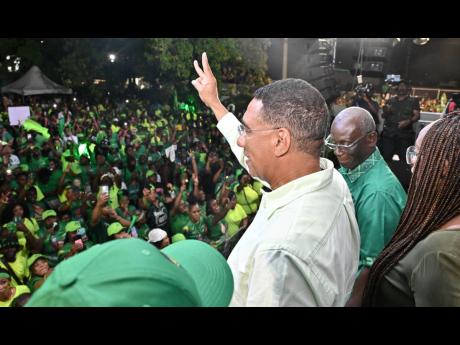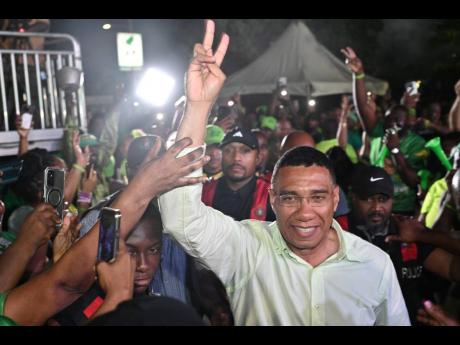Third term loaded
Holness leads JLP to 34-29 win for third term
Dr Andrew Michael Holness etched his name in Jamaica’s political history books last night after leading the Jamaica Labour Party (JLP) to victory in the island’s 19th general election – securing an unprecedented third consecutive term in power for the JLP.
The JLP, which captured 34 of the 63 parliamentary seats, delivered Holness his sweetest triumph while relegating the People’s National Party (PNP) to its longest stay in opposition.
Based on preliminary results, the JLP secured the popular vote with a total of 413,502, surpassing the number of ballots cast for the PNP by 10,311.
The win puts him on course to equal P.J. Patterson’s 14-year tenure as the country’s longest-serving prime minister.
As the preliminary results rolled in, jubilant green-clad supporters turned the JLP’s Belmont Road, St Andrew headquarters into a carnival ground. The sound of bells filled the air, and islandwide videos on social media showed Labourites dancing in the streets.
The JLP’s triumph continues its journey since ending an 18-year drought in 2007. It has now won four of the last five general elections and its 10th since Universal Adult Suffrage in 1944.
The PNP has nine general election wins, its last coming in 2011.
After a bitter 2011 loss, the JLP rebounded in 2016 with a razor-thin one-seat majority before annihilating the PNP 49-14 in 2020. Last night’s results further cemented Holness as one of the most dominant political figures of the post-Independence era.
Days before the election, a RJRGLEANER-commissioned Don Anderson poll found that the PNP held a slim popular vote lead of 3.1 percentage points. The poll had a margin of error of plus or minus three per cent.
Voter turnout was 39.43 per cent, among the lowest in decades.
The JLP victory also comes in the context of the corruption narrative that dogged Holness and his administration throughout the campaign. For years, the opposition PNP hammered away at the Integrity Commission’s inability to certify Holness’ statutory declarations since 2021.
Not an easy victory
In his victory speech, Holness praised the efforts of party workers and supporters, and thanked the thousands of Jamaicans who prayed for him and his family. He made special mention of his lieutenant, General Secretary Dr Horace Chang.
Addressing supporters, the JLP leader said: “This was not victory by default. Make no mistake about it, this was not an easy victory. Make no mistake about it, this was a fight, but we did not descend my political organisation, we did not descend to the gutter to fight. We did not seek to trick the people to win. We did not seek to tear down anyone to lift up ourselves. We did not seek to tear down Jamaica in order to be able to administer the affairs of Jamaicans. We ran a clean, disciplined, focused, well-organised campaign and we proved that we can run a decent campaign and win, and that is how Jamaica has won. That is how Jamaica wins. Our democracy, by this election, is proven to be intact.”
He also noted the low voter turnout and cautioned against complacency.
“The people came out. We do have our concerns about the turnout, but the people who voted, the majority spoke and chose Jamaica.
“We must guard against arrogance ... . This Government, in our third term, must be laser-focused on ensuring that there is prosperity for all Jamaicans.”
On its way to victory, the JLP silenced doubters in key constituencies that many pundits predicted would have gone down to the wire. In St Elizabeth South Western, for example, JLP rising star Floyd Green staved off a challenge from Miranda Wellington, a fiery schoolteacher, to secure a third term as MP.
Based on preliminary counts, he got 9,705 votes to Wellington’s 8,462.
The win meant that St Elizabeth South Western maintains its status as a bellweather seat, and the only one in the island to have voted with the winning party in every general election since the constituency was created in 1959.
In St Mary Western, where JLP Chairman Robert Montague was said to be in a tight race with the PNP’s Omar Woodbine, voters opted to keep Montague for a third consecutive term (2016. 2020 and 2025) and a fourth overall, having won in 2007.
Based on preliminary counts, Montague got 9,394 votes to Woodbine’s 8,451.
The campaign saw both major parties making bold promises to woo voters. The ruling JLP pledged a series of economic and social initiatives, including a plan to double the national minimum wage over the course of their term and gradually reduce the income tax threshold, easing the financial burden on low- and middle-income earners.
The party also highlighted its commitment to education, promising to expand the rural school bus system to ensure safer and more reliable transport for students in underserved communities.
The PNP had an equally ambitious agenda, proposing to increase the tax-free portion of salaries from $1.7 million to $3.5 million, eliminate taxes on overtime pay, and embark on a massive housing project to construct 50,000 new homes, aimed at addressing the country’s housing deficit and providing relief to struggling families.
The JLP Government also campaigned heavily on its record of crime management and economic stewardship. The leadership of the party highlighted a 43 per cent reduction in murders since the start of the year, crediting focused security measures and community engagement initiatives for the improvement.
Economically, the party boasted that no new taxes had been imposed in the last eight years, while unemployment and poverty levels were at their lowest in recent history, framing the administration as both a stabilising and growth-oriented force for the country.
Some 184 candidates, 63 each from the PNP and JLP, contested the elections. The Jamaica Progressive Party contested 43 constituencies, the United Independents’ Congress seven, and nine candidates ran independently, but all failed to make an impact.


